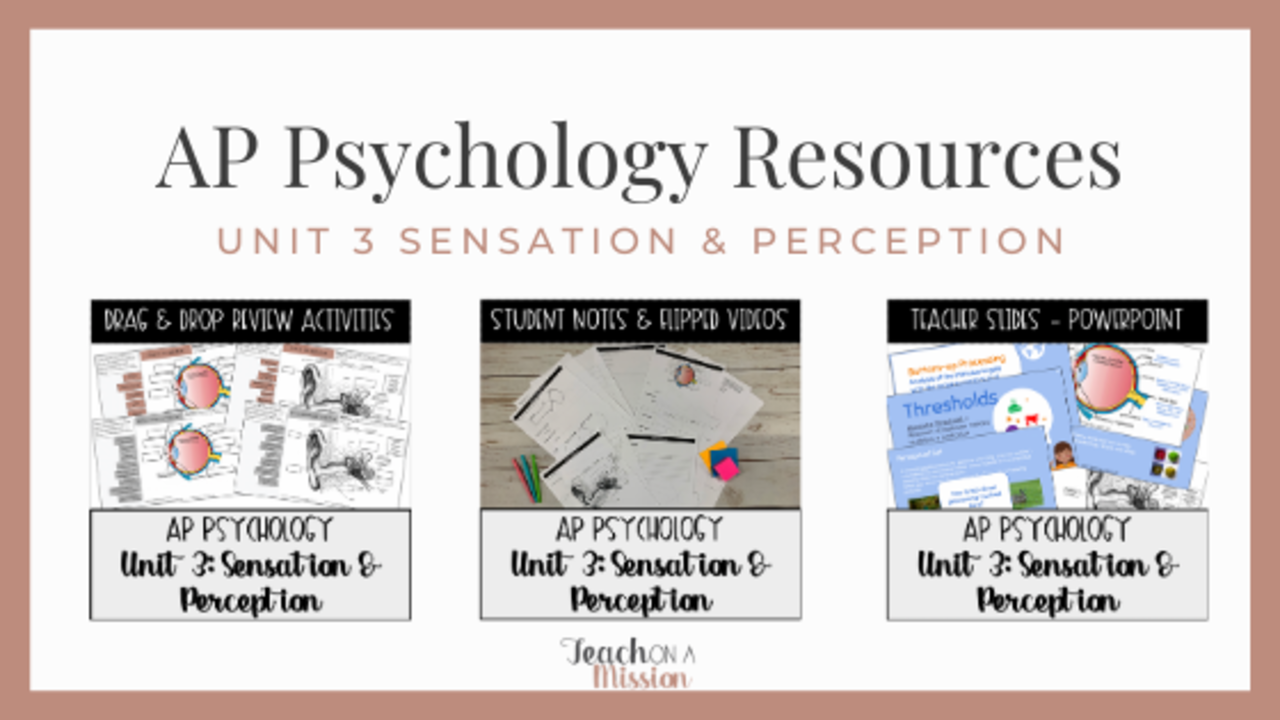AP Psychology Resources for Unit 3 Sensation & Perception

By this time of year, no matter what you teach, you are rolling right along in content yet only holding on for dear life through the awfulness that is October, November, and December when it comes to having motivation and patience. Remember, you can do this!!
Seriously, this time of year is hard. It's hard because there is not really a chance to come for air in the near future. You just have to keep your head down and keep at it. That's why I hope to provide you with resources that are quality, reliable, and engaging for your students in AP Psychology.
Unit 3: Sensation & Perception
Sensation and Perception is also a large unit, meaning lots and lots of vocabulary and new concepts, but it's not necessarily worth it's weight in vocab terms.
Here's what I mean... Sensation & Perception is dense, but it's not big. It's percentage of how many questions on the test will be dedicated to this unit is not as high as biological bases or cognitive psychology, for instance. The lesson to understand here is that you don't want to spend too much time here and you don't want to get bogged down by covering ALL OF THE CONTENT.
That's why I recommend checking out my slides and student notes. They are manageable to get through in a calendar that I lay out for my AP Psychology Content Coaching Members according to College Board's recommended time frame of 9-10 class periods, and they help you focus on the big, important concepts in that time period.
You'll also find the accompanying student notes that guide students through those slides so they can focus on listening to you and engaging with the content (they are still thinking and writing, but the notes make it all a bit more manageable).
A tricky part about Unit 3, Sensation and Perception is that it's still rather biologically based, just like the previous unit. It can be daunting to get through those two units back to back, but I hope that seeing similar ways of engaging with the vocab, particularly parts of the eye and parts of ear, will help students decipher it all.
I made some digital activities to use as quick review in class. I can see these being quick, 5 minute review stations a day or so before taking the test (note, these should not be the ONLY review materials used because they only cover part of the standards for this unit). I assign the Google Draw files in Google Classroom (or you can make a QR code for students to access the draw file, they then make a copy); students work through the parts of the eye, functions of the eye, etc. Then before the end of class, I pull up each of the keys with the entire class, allowing students to check their understanding. You could even have them turn the assignment in on Google Classroom first, but be aware that once they turn in the documents, they no longer have access to them.
Lastly, for a good sensation and perception activity that give students some choice, and allows them to have a bit of fun with the vocabulary, I have a "Carnival" activity for you. This one is totally FREE on my Teachers Pay Teachers store (each of the images are linked by the way). It's a project that you could really expand and make much bigger, but I tried to keep it concise keeping the calendar recommendations from College Board in mind.
I would love to offer some more support to you as you are getting to know this course a bit more. You're probably teaching this course for the first time, or within the first few years of teaching it for the first time, and the content can be incredibly overwhelming. I mean, seriously, when's the last time you even took a psychology course? And now you're teaching one!
Check out this workbook I made for teachers in hopes of helping them set up a well established AP Psychology course the first time.
Until next time,









